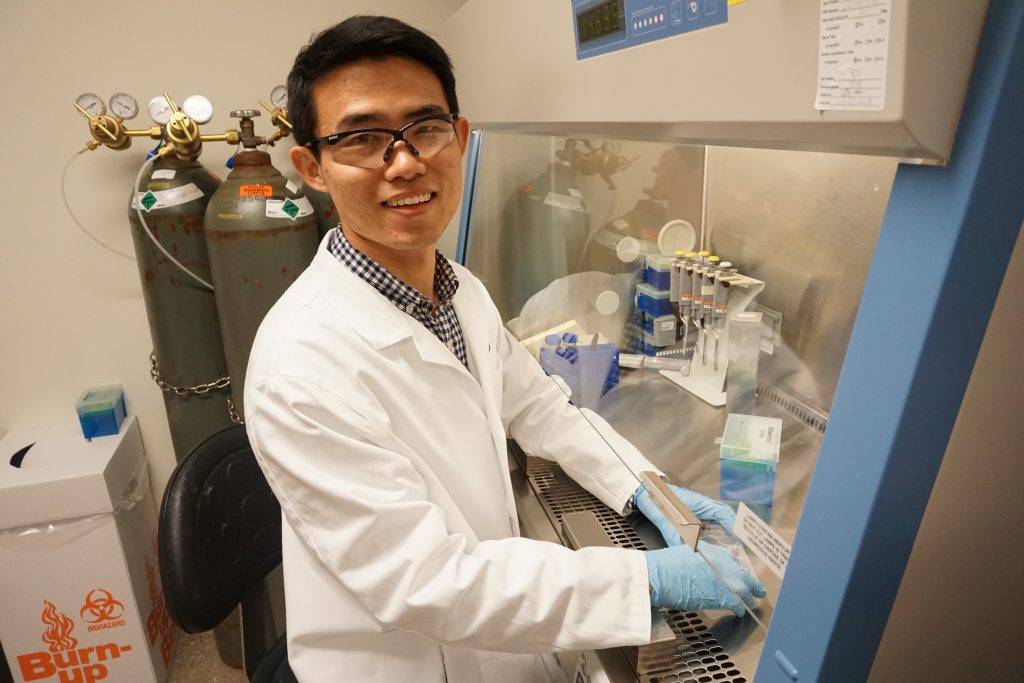Nanotechnology at Northwestern
Meet Wei Cao, a Postdoctoral Scholar in Nathan Gianneschi’s Group
October 07, 2019
Where are you originally from?
I grew up in a small town in the central part of China. I went to Jilin University for my undergrad degree and went to graduate school at Tsinghua University, where I worked on polymer chemistry.
When did you first become interested in chemistry?
I first became interested in chemistry as an undergrad; Jilin University is very strong in super molecular chemistry. Using chemistry beyond molecules to create order structures and functions has always been fascinating to me. I worked on stimuli-responsive selenium/tellurium-containing polymers for bio nanomaterials with Prof. Huaping Xu. With this first taste of research, I came to realize that creating new things that have never been made before and reveling in their unique properties is a truly beautiful experience. I’m really grateful to Prof. Huaping Xu and Prof. Xi Zhang for letting me work in their excellent labs.
How do you explain what you study to people who don’t know anything about nanotechnology?
That’s a difficult job, but these days a lot of kids know about the concept of nanomaterials. Nanotechnology can change the properties of materials and make them do amazing things in water or in humans. My work is inspired by the natural pigment melanin, which gives our skin color and protects us from sunlight. We design and make particles that are less than 1/1000 the diameter of human hair from even tinier molecules. They are so tiny that they can enter skin cells and protect them against damage. We enhance melanin’s advantages by putting new exotic functions in them. We try to push the boundary beyond evolution and explore what does not exist in nature to harness the properties we are dreaming about.
Can you tell me about some potential applications for your work?
The most obvious application for my work is radiation protectors. I’m making nanomaterials that could protect people against radiation environments like airplane travel and clinical radiation. They can form an artificial cap around the cell nucleus and protect cells from the metabolic stress after radiation. The materials can last for a while and eventually degrade without causing bioaccumulation or environmental concerns.
Where do you hope to be with your career in the next five years?
I want to build my own research team back in China. There are a lot of things I am super excited about. Pursuing interdisciplinary research at the border of chemistry, nanotechnology, polymer materials, and biology would be my career goal.
Can you tell me about your experiences either being mentored or mentoring others here at Northwestern?
Peer mentoring is important in the Gianneschi lab, where I’m the soft matter subgroup leader. Our subgroup is highly diverse, with undergrads, graduate students, postdocs, and project scientists. We all offer our expertise and learn from each other, so we have the opportunity to mentor and be mentored, which I’m really grateful for.
I always ask myself what can I do to make our subgroup better. I ask people questions they haven’t asked, help them discover how important their project is, and consider what the future direction could be. Besides, I also try to improve the well-being of subgroup members. For example, I organized a celebration when 2nd-year students Xuhao and Guoping passed their qualifying exam, which I believe is important for our group culture.
It’s my biggest dream to teach people the knowledge I’ve acquired thus far. This summer, I’ve been really excited to mentor an undergraduate student from Northeastern University.
What’s the best part about being a postdoc in the Gianneschi group?
The Gianneschi group is an open environment. We have collaborations with researchers from all over the country and the world. I’m really grateful for being a part of several Multidisciplinary University Research Initiatives (MURI) projects. Meeting with people from different backgrounds and working on the same topic is such an amazingly unique experience.
Nathan is super supportive, even when it takes time, and he also gives me a lot of freedom. Here at Northwestern, I’ve stepped out of my comfort zone and done a lot of things I could not do before or elsewhere. I think I’ve expanded my vision and skill sets tremendously. And I’m more and more clear on what’s going on and where I am going.
Nathan arrives at the lab first and fills his calenders with all types of meetings. I sometimes get a reply from him the second I click send! He always makes me feel that I should work harder.
